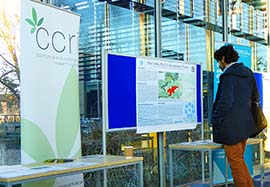 Around 200 people attended a major conference on Natural Flood Management (NFM) at the University of Gloucestershire on 25th January.
Around 200 people attended a major conference on Natural Flood Management (NFM) at the University of Gloucestershire on 25th January.
The conference -“Natural Flood Management: Enabling Partnerships and Action” – was organised by the CCRI and Stroud District Council and was aimed at building partnerships between local communities, flood groups, local authorities and land managers to enable them to deliver effective natural flood management at the local scale.
The conference recounted the real partnerships established to enable Stroud District Council to deliver the Stroud Rural Suds project in Gloucestershire, which is building Natural Flood Management in the catchment of the Stroud River Frome.
 CCRI’s Chris Short and Stroud District Council project officer, Chris Uttley, led the event and were delighted with the positive feedback received and hoped that the conference would inspire other communities to follow their lead.
CCRI’s Chris Short and Stroud District Council project officer, Chris Uttley, led the event and were delighted with the positive feedback received and hoped that the conference would inspire other communities to follow their lead.
An interactive version of the programme can be downloaded, enabling you to link to many of the presentations. [ddownload id=”12406″ text=”Download interactive programme”]
During the day, attendees were encouraged to discuss things on Social Media using the hashtag #GlosNFM17 – this resulted in lively discussions, and a full Storify transcript of the day can be found here.
There were speakers from the Environment Agency, Gloucestershire County Council and the Regional Flood Committee, as well as other experts on building partnerships and community engagement about creating effective and long lasting partnerships between local authorities, communities and landowners to facilitate natural flood management projects on the ground.
 The morning speakers focus on the need for NFM to be understood from a range of perspectives. Claire Dinnis from the Environment Agency outlined that NFM covered a range of activities across the whole catchment covering upland storage, flood plain, in-channel and urban. She said it was a case of working with local stakeholders to determine the right options for the right place and though the evidence was there, different rules need to apply as the interventions are small and widespread. The Environment Agency is working on the development of an evidence directory.
The morning speakers focus on the need for NFM to be understood from a range of perspectives. Claire Dinnis from the Environment Agency outlined that NFM covered a range of activities across the whole catchment covering upland storage, flood plain, in-channel and urban. She said it was a case of working with local stakeholders to determine the right options for the right place and though the evidence was there, different rules need to apply as the interventions are small and widespread. The Environment Agency is working on the development of an evidence directory.
Anne Wheeler, the Chair of the Severn and Wye (England) Regional Flood and Coastal Committee, outlined the need for the Environment Agency and others to engage with local communities and to be flexible about this as there were a range of options and emphasised that it is better to take time over the right option than rush a poor decision. Mark Hawthorne (Leader Gloucestershire County Council) advocated the micro-scheme approach that is being used in Gloucestershire.
Mary Donhau very robustly made the case for local communities to be taken seriously and become fully involved in the process of developing options for NFM. The knowledge transfer between different stakeholders and agencies is a strong enabler for successful projects. As Chris Uttley showed when he outlined the Stroud project and the work over the past 3 years. Stroud has taken a deliberately local focus to the delivery of NFM by developing a circulate economy that develops the skills and maximises the use of local knowledge.
 In a lively discussion, it became clear that when looking at other projects you should ‘learn not copy’ and that the role of the catchment officer should be seen as enabling the development of a local NFM scheme that was cost effective. Bringing local communities together with farmers and landowners does work and they can help develop and implement local projects.
In a lively discussion, it became clear that when looking at other projects you should ‘learn not copy’ and that the role of the catchment officer should be seen as enabling the development of a local NFM scheme that was cost effective. Bringing local communities together with farmers and landowners does work and they can help develop and implement local projects.
The four workshops were lively and could easily have gone on for longer. The summaries presented in the plenary are shown below.
The main findings are that
- the emergence of NFM means that there is a wider recognition that flood defences based in and around areas of population are insufficient on their own to cope with the changing weather and climatic conditions that the UK is experiencing.
- NFM is a new addition to the catchment management tool kit that has now received explicit government backing with the announcement of £15 million in late 2016.
- NFM involves soft-engineering techniques on a small scale that act collectively to ‘slow the flow’ and increasing the availability of temporary water storage areas.
- NFM requires a far greater degree of stakeholder engagement for two related reasons:
- First, it is the collective impact of NFM that is required, meaning that the interventions are required over a wide area of the catchment before the benefit of reduced flood risk is reached.
- Second the land on which NFM is undertaken will be owned and managed by a wide range of people who in order to implement these interventions need to understand NFM and buy into the overall project and its impact on the catchment.
- Great things can happen by working in partnership.




